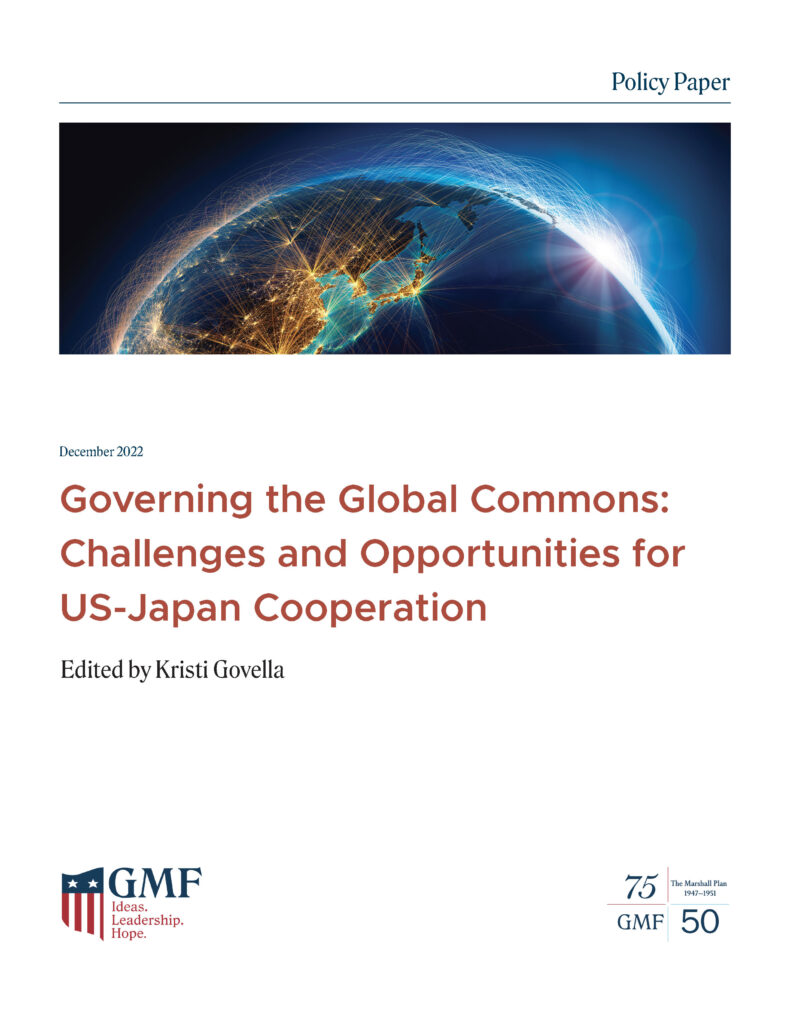
I’m thrilled to announce that my new edited volume Governing the Global Commons: Challenges and Opportunities for US-Japan Cooperation has been published by the German Marshall Fund of the United States. In recent years, the governance regimes of the global commons have faced intensifying challenges due to shifts in the international political, economic, and security environment. In particular, the maritime, outer space, and cyber domains—areas that are crucial for both military and commercial purposes—are under stress due to the rise of China, advances in technology, the multiplication of state and non-state actors operating in the commons, and the emergence of behavior such as gray zone tactics that are difficult to regulate. The result is an increasing crowded and contested set of global commons.
The United States and Japan have been drawn closer together by these issues—by their common interests in maintaining a rules-based international system as well as by their shared values. Both countries stand to benefit from strengthening the governance of the global commons in ways that will continue to support their own security and prosperity. Both countries also recognize that there is need for reform of existing regimes, and in some cases, construction of new ones. This volume brings together US and Japanese experts on the maritime, outer space, and cyber domains to examine the challenges that both countries identify in the global commons and to provide insights as to how they can jointly address these challenges. What are the key pillars of the existing governance regimes that need to be maintained in each of the three domains, and where are the key areas for reform? In cases where regimes are nascent, what are the best ways to shape their rules and norms? Where are the areas of convergence and divergence in US and Japanese perspectives on governance? What scope do policy makers and experts in the United States and Japan see for bilateral cooperation, and how can bilateral cooperation produce global change?
Part 1 comprises my paper, “Emerging Challenges to Governance in the Maritime, Outer Space, and Cyber Domains and Opportunities for US-Japan Leadership,” which provides an overarching analysis of challenges across the maritime, outer space, and cyber domains. It draws on interviews, primary materials, and academic research, as well as insights from experts who attended a workshop convened by The German Marshall Fund of the United States in May 2022. The resultant analysis reveals clear and persistent differences in the governance regimes of these domains, reflecting their different stages of maturity and the varying nature of the spaces and resources that they seek to govern. However, despite the many differences that exist across these three domains, there are also striking commonalities. In each of these domains, central issues of access to space and to resources continue to be debated, reflecting persistent tensions in stakeholders’ preference for enclosure or openness. In addition to challenges to national security across the three domains, problems related to sustainability and human rights are also increasingly discussed.
This analysis also clearly demonstrates that there are strong synergies in the values and interests of Japan and the United States in the maritime, outer space, and cyber domains. While differences in viewpoints exist between the two countries, there is potential for cooperation, coordination, and consultation on a wide range of matters. In the maritime domain, the paper discusses the potential to address issues related to freedom of navigation, rules for maritime zones, regime legitimacy, fisheries management, human rights at sea, and green shipping. In the outer space domain, it examines space situational awareness, space traffic management, space debris, anti-satellite tests, and space resources. In the cyber domain, it addresses the conflicting norms of openness versus enclosure, privacy and data flows, artificial intelligence, cybercrime, human rights and digital authoritarianism, cognitive warfare, cyber defense norms, and sustainability. While this list of issues is not exhaustive, it offers a starting point from which to begin thinking holistically about governance regimes across the three domains, which is further discussed in the conclusion of this paper.
Part 2 of the volume contains six policy briefs, which examine specific issues in a single domain. Beginning with the maritime domain, John Bradford discusses ways that the coast guards of the United States and Japan can become agents to improve global maritime governance, while Kyoko Hatakeyama focuses specifically on the importance of supporting governance related to freedom of navigation. Moving on to the outer space domain, Saadia Pekkanen examines developing state practice for the governance of outer space resources, and Setsuko Aoki emphasizes the importance of banning direct ascent anti-satellite (ASAT) tests for the safety and sustainability of the domain. Finally, with respect to the cyber domain, James Lewis discusses emerging structures of governance, and Motohiro Tsuchiya explores the emerging challenge of cognitive warfare.
Overall, the two parts of this edited volume demonstrate the importance of the global commons to the United States and Japan and the potential for these two countries to work together to shape a rules-based international order that creates a more sustainable basis for their long-term security and prosperity. In addition to formulating joint tactical responses to specific challenges in the global commons, promoting good governance is an essential part of ensuring that their spaces and resources remain available to state and non-state actors around the world. Discussions of principles, rules, norms, and decision-making procedures must be put at the forefront of diplomacy. While the United States and Japan cannot solve the problems of global commons governance on their own, they have the capacity and influence to make a significant contribution. Moreover, US-Japan bilateral cooperation can serve as a building block for broader regional and international coalitions to achieve their shared governance goals.
